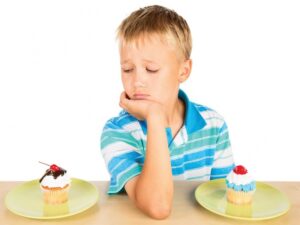It’s the weekend, and if you’re a parent of young children, you know what that means—birthday parties. Every parent knows the hurried hustle involved when preparing to attend a child’s birthday party. But while most parents only have to prepare one “special something” for the birthday boy or girl, Dana M. always prepares another special treat, an allergy-free one, for her daughter. Dana’s daughter is one of the 5.9 million children in the U.S. living with a food allergy. According to Food Allergy Research & Education, one in every 13 kids in the U.S. has a food allergy, which equals about two kids in every classroom.
If your child is one of the 5.9 million, here are some helpful hints on how to teach them to become their own advocates for their food allergies.
Teach simple rules
Let your child know that certain foods will make him or her very sick by using simple phrases such as “safe foods” and “unsafe foods.” Dr. Ben Gaudin of The Allergy, Asthma, & Sinus Center says, “It’s important to teach younger children to only eat food that is specifically made for them and that it is not safe to share food or even spoons, forks, knives, cups, bottles, or straws.”
Talk openly about their allergy
Always maintain a positive attitude. Let your child know that it is serious but not scary. As a parent, remember you always set the tone. Your child will mirror your attitude towards food allergies, whether that is positive or negative.
Get hands-on
Use everyday experiences, like trips to the grocery store, as “teachable moments” to help them identify safe and unsafe foods and what they look like. Point out gallons of milk, egg cartons, bags of peanuts, or other relevant allergens.
Look at labels
Once your child can read, read the food labels with them. Be sure to teach them that the food they are allergic to may have a variety of names, not just its most common name. Dr. Joseph Redhead of the Baton Rouge Clinic, AMC says, “Parents can begin to tell their child each time they give them food, ‘I have read the food labels and there isn’t any milk (or egg or peanut, or whatever the relevant food allergen may be), so it’s safe to eat this food.’” By doing this consistently, you are helping them develop the habit of always checking food labels. If you are unsure about an ingredient on a food label, don’t hesitate to call the manufacturer.
When in doubt, say no
The general rule of thumb is that if the child is not 100 percent sure the food is allergen free, they shouldn’t eat the food. Dr. Adrianne Edmundson of The Allergy Asthma & Sinus Center says food allergen label laws were created to help in this process. Laws now require the label to clearly state if the item contains a “Top 8 Food Allergens” (milk, egg, peanut, tree nut, wheat, soy, fish, or crustacean shellfish).
Educate the educators
Food allergy parents may quickly learn that not all adults fully understand the complexities of food allergies. Reach out to your child’s educators and caretakers and inform them about your child’s specific case. By partnering with these key figures in your child’s life, together they can help you reinforce the food allergy messages you have conveyed to your child.
Tell them a story
There are dozens of age-appropriate books available on food allergies. This is especially helpful in helping young children understand their allergy. Founder of Baton Rouge Food Allergy Support Group, Brittany Carr Leblanc, says this is especially helpful in helping young children understand their food allergies.
Build an allergy toolbox
Arm your child with the tools they need to protect themselves. This may be something as simple as labeling food items in your home as “safe” or “unsafe,” providing them with a medical alert bracelet such as AllerMates wristbands, or arming them with their personal allergy kit or EpiPen and showing them how to use it.
Tell an adult
Make sure your child knows not to be afraid if they think they might have accidentally eaten something they were not supposed to. If something makes them feel funny or strange, encourage them to immediately tell an adult.
Establish a correct diagnosis
Dr. Gaudin emphasizes that it’s important to establish a correct diagnosis, and that there are unique hurdles at different ages for the food allergic child, so ongoing follow-ups with a board-certified allergist is crucial. ■






